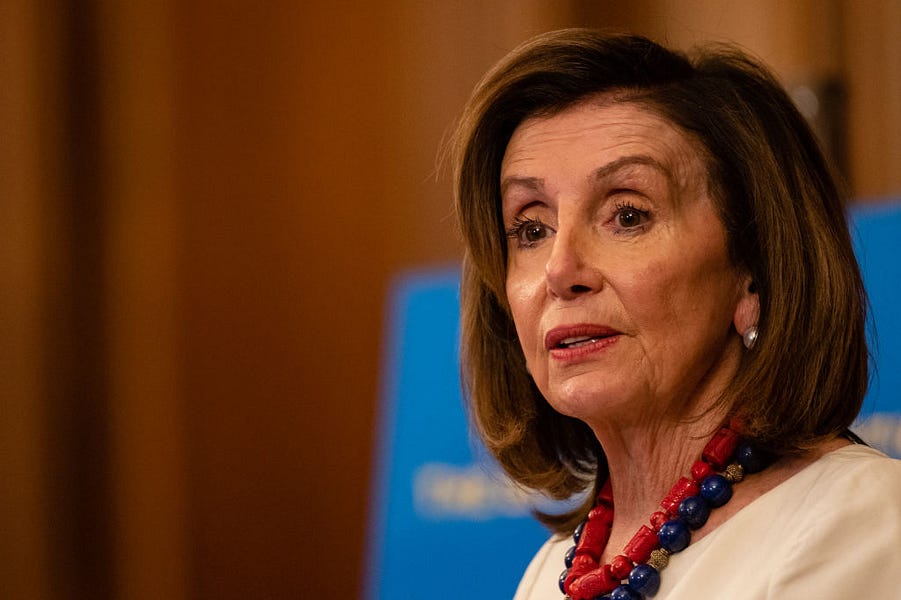When politicians and reporters raised questions about Congress members and staffers trading individual stocks in December, House Speaker Nancy Pelosi was cold to calls to buckle down. “We are a free-market economy,” she told a reporter. “They should be able to participate in that.”
A December Business Insider report had showed hundreds of congressional members and staffers violated the Stop Trading on Congressional Knowledge (STOCK) Act of 2012 with little-to-no penalties and hard-to-come-by information on violators.
The report followed Justice Department investigations of Sens. Diane Feinstein, James Inhofe, Kelly Loeffler, and Richard Burr for allegedly dumping stocks after receiving briefings about COVID-19 and before the market tanked during the early stages of the pandemic. The DOJ closed the investigations of Inhofe, Feinstein, and Loeffler. But as of October its investigation of Burr remained open, CNN reported. (The Securities and Exchange Commission didn’t respond to The Dispatch’s request for comment).
About two years ago, a federal judge sentenced former Rep. Chris Collins to 26 months in prison for insider trading and lying to the FBI after giving his son a stock tip on a drug company. (Former President Donald Trump pardoned him in December 2020).
When a reporter last week asked a similar question to Pelosi (who has faced criticisms for her husband’s stock portfolio), her answer was different: “If members want to do that, I’m OK with that.”
Pelosi’s change in attitude comes as more members of Congress want action on the issue. House GOP Leader Kevin McCarthy is publicly considering a rules change if Republicans take the chamber, and lawmakers on both sides of the aisle have introduced legislation to end even the appearance of insider trading.
Earlier this month, freshman Democratic Sens. Jon Ossoff and Mark Kelly teamed up to write a bill that would ban members and their families from trading stock, and Republican Sen. Josh Hawley introduced his own version of a similar bill.
One member of the House, Rep. Angie Craig of Minnesota, called for a ban on members of Congress owning any stocks, let alone trading while in office.
The issue is appearing on the campaign trail too. Current Pennsylvania Lt. Gov. and Democratic Senate candidate John Fetterman called for a ban on lawmakers, their spouses, and their senior staff from holding individual stocks.
In the Senate, Hawley introduced his bill, “Banning Insider Trading in Congress Act,” the same day Ossoff and Kelly introduced theirs: the “Ban Congressional Stock Trading Act.”. Both bills have the same goal: preventing members of Congress from trading stock based on privileged information they receive as elected officials. They differ in how they do it.
Hawley’s bill enforces the ban by rerouting (or “disgorging”) the illegal profits to the U.S. Treasury, or as Hawley puts it, giving the profits back to the taxpayer. The bill also would leave further punishment up to ethics committees.
Ossoff and Kelly’s bill is similar to Hawley’s but also includes dependent children of lawmakers in the ban. Their bill enforces the ban by fining lawmakers their entire congressional salaries rather than disgorging profits to the Treasury.
Hawley told The Dispatch he doesn’t like what he sees as a carve-out for so-called progressive investments that meet environmental, social, and government criteria, though Ossoff’s office told The Dispatch Hawley is misreading the bill.
Even with the differences, Hawley told The Dispatch he is open to working with Ossoff and Kelly: “I think there’ll be room to work together on this.”
House members have crafted legislation much like the Senate bills. Democratic Rep. Abigail Spanberger and Republican Rep. Chip Roy have co-authored the “Transparent Representation Upholding Service and Trust in Congress Act” (aka “TRUST in Congress Act”) in the House. This bill also would require members of Congress, their spouses, and dependent children to place investments in a blind trust within a certain time of taking office.
“We think it ought to be pretty simple: At a minimum why are you engaging in active trading while you’re making massive decisions about Big Tech, Big Pharma, insurance companies, all these things that people have massive investments in all these?” Roy told The Dispatch.
Not all elected officials back the proposed changes, though. “In principle, I’m not sure that we need to do anything beyond what we do now,” Republican Sen. Pat Toomey of Pennsylvania told The Dispatch. “We have a very extensive reporting requirement so the entire world can see everything we do. Not sure there’s complete political accountability for that. And insider trading is illegal for us as it is for anyone else, so I’m not sure that that’s necessary.”
Some Republicans avoided questions about the bills or said they did not know enough to answer, while others are starting to get behind the idea.
Sen. Marco Rubio told The Dispatch any member who trades stocks is “crazy” and that he doesn’t have any beyond a standard retirement fund. “You open yourself up to arguments that you might have found something out,” he said. “I think you’re setting yourself up for trouble.” Still, he said he was undecided on what he would support.
For now, White House Press Secretary Jen Psaki indicated President Joe Biden is letting Congress take the lead on addressing the issue: “He’ll let members of the leadership in Congress and members of Congress determine what the rules should be.”
Audrey Fahlberg contributed to this report.







Please note that we at The Dispatch hold ourselves, our work, and our commenters to a higher standard than other places on the internet. We welcome comments that foster genuine debate or discussion—including comments critical of us or our work—but responses that include ad hominem attacks on fellow Dispatch members or are intended to stoke fear and anger may be moderated.
With your membership, you only have the ability to comment on The Morning Dispatch articles. Consider upgrading to join the conversation everywhere.